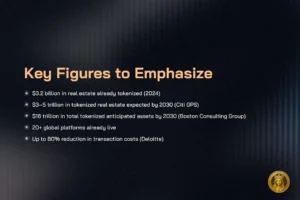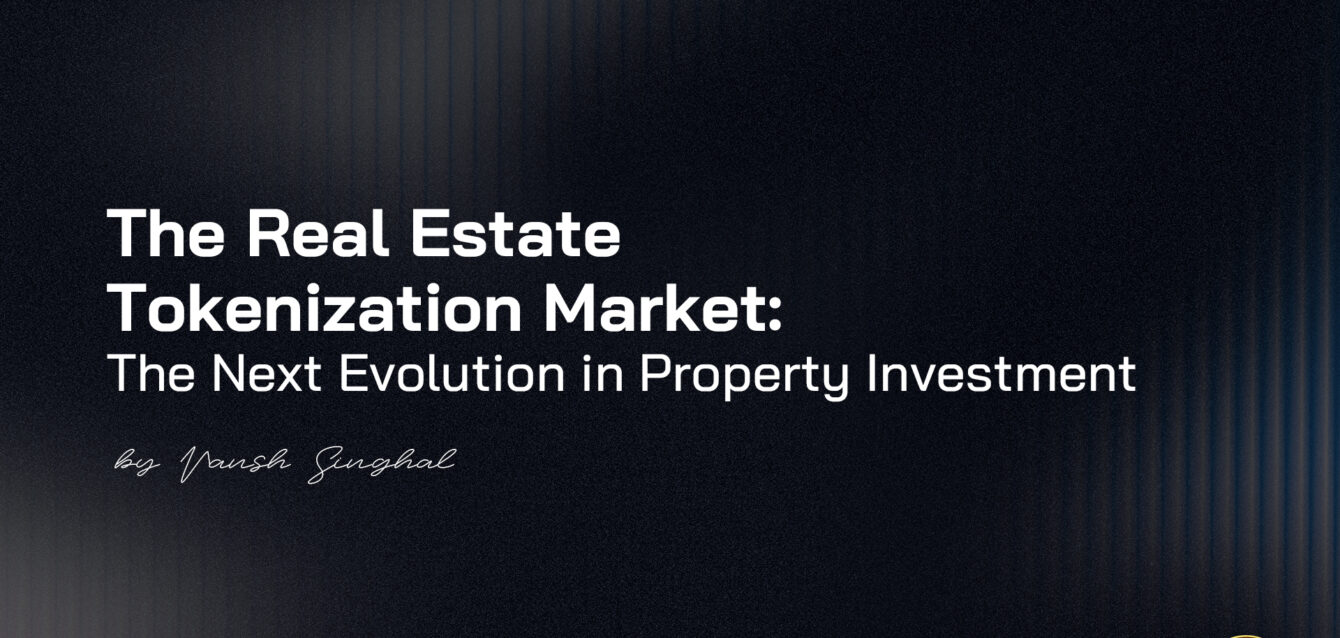Entering a New Era
Real estate tokenisation is not just a theory; it’s a practical and innovative age investing tool. Platforms like RealT, Landshare, RedSwan CRE, PropShare, and Brickken already allow investors to buy fractional property tokens in places like the US, UK, Europe, UAE, Singapore, and India. Earlier, real estate was a market for the wealthy. The location, people, and other significant factors limited it. Tokenization is changing this by letting anyone, anywhere, invest in property in a fast, digital, and transparent way. This isn’t just some future idea: it’s already happening in leading economies worldwide.
Real estate properties already being tokenized range from single-family homes and commercial buildings to hotels, farmland, and even infrastructure projects. As of 2024, $3.2 billion in global estate has already been tokenised, which is still minimal compared to the real estate global market, which is 300+ trillion dollars, but adoption is accelerating. According to Citi GPS, tokenised real-world assets could reach up to $4-$5 trillion by 2030, with real estate leading the way.
Growth Potential and Where It’s Headed
The growth project for real estate tokenization is not just big, it is transformative. According to Boston Consulting Group, the total value of tokenized assets could reach as much as $16 trillion by 2030, with real estate making up the largest share. Even if only 1% of global property is tokenized, that represents about $3 trillion in new market value, a 1000x jump from today’s numbers.
What’s especially exciting is that the fastest adoption isn’t from traditional financial centers but emerging markets. Countries like India, Southeast Asia, Africa, and the Middle East are seeing the most rapid growth in tokenized real estate platforms. This is driven by a new generation of young, digitally savvy investors eager for global opportunities. In these regions, even first-time investors can now participate in the real estate market, something that was nearly impossible before.
Another breakthrough is the rise of secondary exchange platforms like INX, Oasis Pro, and others, which allow real estate tokens to be traded instantly, just like stocks. This brings unprecedented liquidity to property investment, making it faster and easier for people to buy and sell shares in buildings, land, or infrastructure anywhere in the world. In short, the next five years could see real estate investing become more open, global, and efficient than ever, unlocking trillions of value and bringing millions of new participants into the market.
What it brings to the economy
Real estate tokenization unlocks the potential of dead and underused properties like empty lots and old buildings, which can be renovated to speed up development and revitalize cities and rural areas.
Real estate tokenization lets anyone invest with small amounts, sometimes just a few dollars, without needing large down payments or complex paperwork. When you buy real estate tokens, you purchase a financial share in the property, not physical ownership or control. As the property generates rent or appreciates, token holders receive some income and gains. All legal rights and management stay with the platform or trust. This model makes real estate investment accessible, transparent, and efficient for investors everywhere.
Investors from any country can own a piece of property anywhere, while builders can raise funds from a worldwide pool of backers. Blockchain keeps every transaction traceable, reducing black money, tax evasion, and corruption. Cutting out intermediaries and streamlining deals slashes costs by up to 80% (Deloitte), and real-time pricing lets markets react instantly to changes in value or demand.
Risks, Challenges, and How to Build a Safer Tokenized Future
Real estate tokenization brings exciting possibilities, but also faces real risks. Regulatory uncertainty is a significant challenge, as laws for digital property are still evolving and can differ across countries, confusing both investors and builders. The risk of fraud and scams is also present without strict oversight; some platforms might allow fake listings or let builders take money without delivering results. Market volatility can become problematic if tokens trade like cryptocurrencies, making prices unstable. Cybersecurity threats, like poorly protected smart contracts or wallets, can lead to significant financial losses. And finally, the digital divide could leave out those without access or technical skills.
To overcome these challenges, the industry must prioritize strong solutions. Clear legal frameworks and global standards are essential. Only regulated, audited platforms with proper KYC and AML checks should be trusted, and properties must be thoroughly vetted before listing. Security measures like smart contract audits and multi-signature wallets help protect funds and data. Releasing funds to builders only as verified milestones are achieved adds accountability. Investor education and simple, user-friendly platforms offering multiple languages and easy payment options will help make tokenization safe, fair, and accessible for everyone.

Wrap up by restating that tokenized real estate is not just a new way to invest—it’s the beginning of a new financial era. If legal and technical safeguards are built right, tokenization will make real estate investing more efficient, transparent, and open to everyone. For investors looking for the most advanced, future-ready ways to grow wealth, this is a movement to watch and to join early
get in touchLet’s connect. Your financial glow-up starts here.
Got questions? Ideas? Big goals? Let’s talk money, AI, and everything in between.
Resources
How to buy LDFX
Audit Report
Other Links
How to buy LDFX
Audit Report



